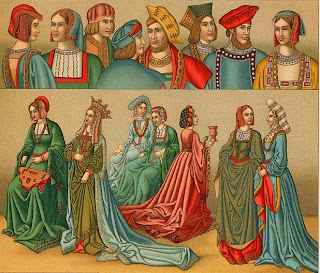This story portrays a clear image about the duties of a wife during the Middle Age. Margaret Paston was only 18 years old when she got married. Her husband John Paston was always traveling because “Husbands of the upper middle class were frequently required to serve the king, acting as his representative in London and abroad and landowners’ business interests often took them away from their country estates to towns, cities and even abroad”( Margaret Paston and the Landed Gentry, p1), for that reason the husbands had leave their wives in charge of their business. During his absences Margaret was responsible to take control over her husband’s businesses and the house’s administration. Unfortunately, it was not an easy work for Margaret because she had to cooke hand and bacon, preserve fruits and bake bread. She also had to act as her husband’s agent in the country, had to collect the rent, manage the staff and tenants. Margaret found this task so difficult because she was too young, she did not have the experience doing this and giving orders to other men. It was very common that during the Middle Age the wife took care of her husband’s business, sometimes because her husband had to serve the king or because her husband died. During the Middle Age a lot of women did not have husband because they were married old men who died before them, and as a result of this they had to be man and woman in their homes. In one of my post about “ How the Good Wife Taught Her Daughter” I talk about a mother who advise her daughter about the importance of taking care of her husband’s money, and working together to increase it. I think Margaret Paston is a good example of a good daughter that listen her mother because she was only 18 years old without experience about business, and she was working hard to take care of her husband’s money.
Sunday, March 25, 2012
Saturday, March 24, 2012
How the Good Wife Taught Her Daughter Edited by George Shuffelton
This story talks about how a mother during Middle Age was responsible to teach her daughter about everything she had to know to be a good wife. Married women were required to follow the traditions during medieval times, one of the ways they represented it was following their mother advice of not doing inappropriate things that could affect their reputation and relationship. One example of this tradition is in the poem “How the Goodwife Taught her Daughter” it states “For no covetys no giftys thou take;/ Bot thou wyte why, sone them forsake. / For gode women with gyftys/ Men ther honour fro them lyftys” (goodwife taught her daughter 91-94). This is an advice from the mother to her daughter, it talks about that the woman must not accept gifts from men because they will steal woman’s honor with gift. This poem also talk about how important was that the women took care of the money, the mothers during Middle Age used to advised their daughters about the importance of saving their husband’s money and working together to increase it. For the goodwife during medieval times was very important that her daughter followed her advises of how to respect her husband and be a good wife. However, not all of the married women during the Middle Age were following the traditions and behaved the same way, because in my previous post “The Shipman’s Tale”, I talked about a wife who was not taking care of her husband money and was having sex with her husband’s best friend to get money. This wife is not a good example of a daughter who was following her mother’s advice. I believe that when the interest of a woman to get what she wants is above her dignity, she will lost something very important the respect for herself.
Sunday, March 11, 2012
The Shipman's Tale by Chauser
This story describes a married woman who was using her intelligence and physical attractiveness to control men and get money from them. This story show us how a woman who was married with a merchant, was having sex with her husband’s best friend to get money, for her the money was more important than love and be loyal to her husband. This wife lied to her husband’s best friend (the monk) telling him that she was having trouble to get his money, she states “On next Sunday I must of necessity pay A hundred franks, or else I am lost. Yet I would rather that I were never born Than a disgrace or dishonor were done to me; And also if my husband might discover it, I would be as good as lost; and therefore I pray you, Lend me this sum, or else I must die”(The Shipman’s Tale, 180-186). This story portrays a different image from other stories about married women during the Middle Age, for example in my previous post about the story of Griselda a woman who swore to obey her husband no matter what, she always respect and did what her husband said because it was an important tradition during the Middle Age.
Subscribe to:
Comments (Atom)


